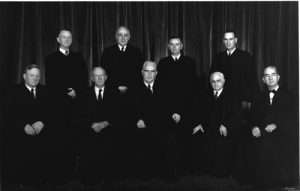The Volokh Conspiracy
Mostly law professors | Sometimes contrarian | Often libertarian | Always independent
Today in Supreme Court History: October 18, 1960
10/18/1960: Gomillion v. Lightfoot argued.

Editor's Note: We invite comments and request that they be civil and on-topic. We do not moderate or assume any responsibility for comments, which are owned by the readers who post them. Comments do not represent the views of Reason.com or Reason Foundation. We reserve the right to delete any comment for any reason at any time. Comments may only be edited within 5 minutes of posting. Report abuses.
Please to post comments


Rivas-Villegas v. Cortesluna, 595 U.S. --- (decided October 18, 2021): plaintiff sued under §1983 for excessive force; Court held that police officer who put knee in his back after he was already on the ground was entitled to qualified immunity (plaintiff had threatened and cornered wife and children in house, came out at command of police with knife in his pocket, and officer briefly placed his knee on plaintiff's back when handcuffing him and removing his knife); unanimous Per Curiam decision (this lawsuit was a new definition of "chutzpah")
Bergere v. United States, 168 U.S. 66 (decided October 18, 1897): this decision on grants of land under a contested Will in the New Mexico territory presents a riot of law school issues, e.g., whether cattle grazing amounts to adverse possession, whether a torn document is an enforceable contract, to what extent the Court will apply the law of Mexico and Spain that were in effect at the time and place in question, whether delivery of land by the alcalde (mayor) binds the governor, etc.
James v. Louisiana, 382 U.S. 36 (decided October 18, 1965): search of drug arrestee's home two blocks from where he was arrested was not a "search incident to arrest" and therefore evidence seized there was inadmissible
Re: Gomillion v. Lightfoot
Facts of the case
An act of the Alabama legislature re-drew the electoral district boundaries of Tuskegee, replacing what had been a region with a square shape with a twenty-eight sided figure. The effect of the new district was to exclude essentially all blacks from the city limits of Tuskegee and place them in a district where no whites lived.
Question
Did the redrawing of Tuskegee's electoral district boundaries violate the Fifteenth Amendment?
Conclusion (9 - 0 !!!)
A state violates the Fifteenth Amendment when it constructs boundary lines between electoral districts for the purpose of denying equal representation to African Americans.
The unanimous Court held that the Alabama legislature violated the Fifteenth Amendment. Justice Frankfurter admitted that states are insulated from judicial review when they exercise power "wholly within the domain of state interest." However, in this case, Alabama's representatives were unable to identify "any countervailing municipal function" the act was designed to serve. The Court believed that the irregularly shaped district was drawn with only one purpose in mind: to deprive blacks of political power. (Oyez)
Would not be unanimous if it were decided today.
That begs the question: How do states now justify changing district boundaries?
One would hope the justification is based on raw population numbers (but we know both sides aren't clean on this).
In this case, ". . . Alabama’s representatives were unable to identify 'any countervailing municipal function. . . '” to support their changes.
Alabama would be more inventive today. At the time they were still in a segregation mindset and probably didn't think they needed a reason.
Well, it was pre VRA, so yeah.
Might not even be decided the same way.
Nor should it be, now that maximizing black political power is considered ok, Sauce for the goose...
Old-timey conservative bigots are among my favorite culture war casualties . . . and a core of the target audience of a white, male, right-wing blog!
Remember that Potter Stewart, who was part of the unanimous Gomillion ruling, authored the plurality decision in Mobile v. Bolden, 446 U.S. 55 (1980), which curtailed Gomillion.
I had the pleasure to meet Fred Gray, who argued the case, after a talk he gave and get a signed copy of his book, Bus Ride to Justice. It was a great honor.
I wonder if he structured his argument so as to win over Frankfurter, who normally took a hands-off approach to legislation.
Meanwhile, John Durham racks up yet another acquittal.
Quite a showing.
The evil Warren Court is nor rehabilitated by occasionally getting the obvious right. It's evil because of all the smarmy times it deliberately got the obvious wrong.
And the word you're looking for is "reining".